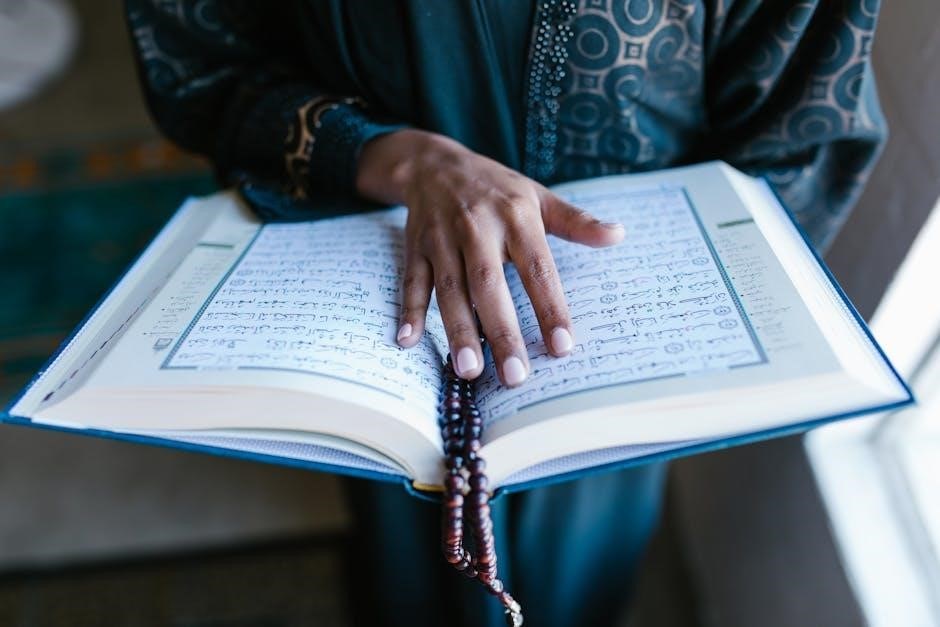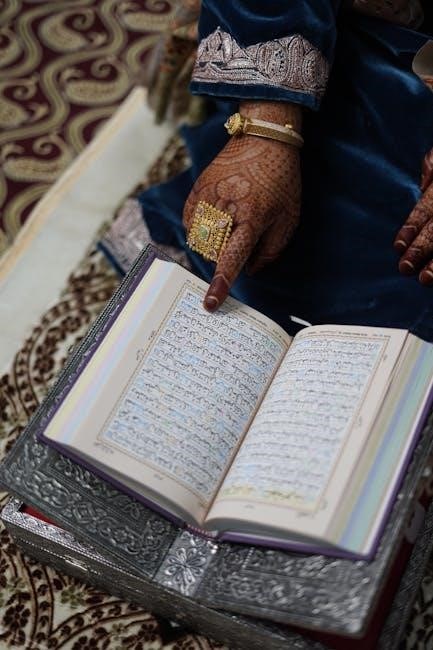Welcome to this comprehensive guide on the first para of the Quran, a foundational section for understanding Islamic scripture․ Discover its significance, content, and relevance in PDF formats․
1․1 Historical Significance of the First Para
The first para of the Quran holds profound historical and spiritual significance, marking the beginning of divine revelation․ It is a cornerstone of Islamic worship, recited daily in prayers, and embodies core teachings․ Revealed in Arabic, it guides believers in worship and righteousness, reflecting the Quran’s role as a source of guidance․ Its availability in PDF formats has made it accessible globally, preserving its timeless message for modern learners and facilitating deeper study and reflection․
1․2 Overview of the Content and Structure
The first para of the Quran consists of seven verses, opening with Surah Al-Fatihah, the “Mother of the Quran․” It establishes foundational themes of praise, guidance, and devotion, emphasizing the oneness of God․ The structure is poetic yet profound, with each verse building on the next to create a cohesive message․ Linguistically, it showcases the Quran’s unique beauty, blending elegance with clarity․ PDF versions preserve this structure, offering a clear and accessible format for readers to engage with the text deeply․

The First Para in PDF Format
The first para of the Quran is widely available in PDF format, offering a convenient and accessible way to study the text․ These files typically include the Arabic script, translations, and sometimes commentary, making them a valuable resource for both learners and scholars․ PDF versions ensure clarity and portability, allowing users to engage with the first para anywhere, anytime, while preserving the original text’s integrity and beauty․
2․1 Availability of the First Para in PDF
The first para of the Quran is readily available in PDF format across various platforms, including religious websites and educational resources․ Websites like Internet Archive and IslamiCity provide free downloads, ensuring easy access for learners and scholars․ These PDFs often include the Arabic text, transliterations, and translations, making them versatile for different needs․ Additionally, some platforms offer annotated versions with commentary, enhancing understanding for those seeking deeper insights․ This widespread availability makes it simple for anyone to access and study the first para in a digital format․
2․2 Benefits of Using a PDF Version
Using a PDF version of the first para of the Quran offers numerous advantages․ It provides portability, allowing easy access on various devices․ Multi-language support, including Arabic text, transliterations, and translations, caters to diverse learners․ Interactive features like search and bookmarks enhance study efficiency․ High-quality formatting ensures clarity and readability․ Additionally, PDFs are cost-effective and environmentally friendly, making them a practical choice for both personal and educational use․ This format is ideal for those seeking convenience and comprehensive resources in one place․

Understanding the First Para
Understanding the first para of the Quran involves exploring its linguistic beauty and spiritual depth․ It introduces key themes like worship, guidance, and mercy, offering divine wisdom for believers․
3․1 Key Themes and Messages
The first para of the Quran introduces central themes such as worship, guidance, and mercy․ It emphasizes Allah’s sovereignty and humanity’s purpose, offering divine wisdom and spiritual direction․ The text highlights the importance of righteousness, prayer, and seeking guidance, while also underscoring the balance between worldly life and the hereafter․ These themes are intricately woven, providing believers with a foundational understanding of Islamic teachings and their practical application in daily life․
3․2 Linguistic and Spiritual Importance
The first para of the Quran holds profound linguistic and spiritual significance․ Its poetic yet profound Arabic text is considered a miracle of language, embodying divine wisdom․ Spiritually, it serves as a cornerstone of worship, guiding believers in their relationship with Allah․ Its recitation is a means of seeking blessings, comfort, and enlightenment, making it a vital part of Islamic devotion and daily spiritual practice․

How to Study the First Para
Start with short sessions, focusing on understanding and memorization․ Use translations and commentaries for deeper insights․ Practice regular recitation to enhance spiritual connection and grasp the divine message effectively․
4․1 Tips for Beginners
For beginners, start with short, manageable sessions to build a routine․ Use a PDF version of the first para for easy access and portability․ Focus on understanding the basic Arabic text with the help of translations and commentaries․ Practice recitation aloud to improve pronunciation and connection․ Break down the para into smaller sections for gradual memorization․ Utilize online tools and platforms like the Quranic Arabic Corpus for linguistic insights․ Prioritize comprehension over speed to deeply grasp the divine message․
4․2 Using Translations and Commentaries
Translations and commentaries are invaluable for understanding the first para of the Quran․ They provide clear explanations of complex Arabic text, making it accessible to non-native speakers․ Utilize resources like Maulana Muhammad Ali’s translations for deeper insights․ Online platforms such as the Quranic Arabic Corpus offer linguistic analysis, enhancing comprehension․ These tools bridge language gaps and enrich spiritual connection, ensuring a meaningful study experience tailored to individual needs and levels of understanding․

Resources for the First Para
Explore reliable platforms offering the first para in PDF format, such as the Internet Archive and IslamiCity․ These resources provide easy access to translations and study tools․
5․1 Popular PDF Platforms and Websites
Several platforms offer the first para of the Quran in PDF format for easy access․ The Internet Archive provides free downloads of Quranic texts, including the first para․ IslamiCity features a comprehensive Quran search engine with transliterations and translations․ Additionally, platforms like QuranSearch․net and alahmadiyya․org offer detailed commentaries and translations by scholars like Maulana Muhammad Ali․ These resources are ideal for both beginners and advanced learners seeking to study the Quran in depth․
5․2 Recommended Tools for In-Depth Study
For a deeper understanding of the first para, utilize tools like The Quranic Arabic Corpus, which offers linguistic analysis․ Maulana Muhammad Ali’s commentaries provide insightful explanations․ Additionally, platforms like IslamiCity’s Quran Search and The Holy Quran Search Engine allow users to explore translations, phonetics, and thematic searches․ These tools enhance comprehension and facilitate a more immersive study experience․
Cultural and Religious Significance
The first para holds profound cultural and religious significance, serving as the cornerstone of Islamic worship in daily prayers and uniting global Muslim communities through its timeless message․
6․1 Role in Daily Prayers and Rituals
The first para is intricately woven into Islamic worship, recited in each of the five daily prayers․ Its seven verses, known as Al-Fatihah, are a cornerstone of ritual, guiding believers in seeking divine guidance․ This sacred text is repeated in every prayer, emphasizing its central role in connecting worshippers to Allah․ Its recitation fosters unity and spiritual focus, making it an indispensable part of Muslim devotion and practice worldwide․
6․2 Impact on Muslim Communities Worldwide
The first para of the Quran holds profound influence globally, fostering unity and spiritual enrichment in Muslim communities․ Its universal message of divine guidance resonates across cultures, uniting believers in shared faith and practice․ Recited daily in prayers, it strengthens individual and communal worship, inspiring moral integrity and compassion․ This sacred text serves as a cornerstone for Islamic education and personal reflection, nurturing spiritual growth and reinforcing a collective identity among Muslims worldwide․

Memorization and Recitation
Memorizing the first para is vital for spiritual growth, aiding in daily prayers and connecting believers worldwide․ Techniques include regular recitation and using digital aids, enhancing understanding and fostering unity․
7․1 Techniques for Effective Memorization
Effective memorization of the first para begins with consistent practice and repetition․ Start by breaking the text into smaller sections and reciting daily․ Use melodic recitation to enhance retention․ Incorporate digital tools, such as Quran PDF apps, to track progress and access audio guides․ Engage in mindful reading, reflecting on meanings to deepen understanding․ Regular group study and practice with others can also reinforce memorization․ Over time, these methods will help solidify the first para in your memory, fostering spiritual connection and fluency;
7․2 The Art of Recitation in the First Para
The art of reciting the first para involves mastering proper tajweed and melody, ensuring the words resonate with spiritual depth․ Use PDF resources with audio guides to mimic skilled reciters․ Focus on understanding the meanings to convey emotions effectively․ Regular practice with a tutor or online tools enhances fluency and accuracy․ The goal is to recite with harmony, clarity, and devotion, connecting deeply with the divine message embedded in the first para․

Reflection and Application
Reflecting on the first para enriches spiritual growth, emphasizing gratitude and worship․ Apply its teachings daily by seeking guidance and embodying compassion, using PDF guides for deeper insight․
8․1 Spiritual Reflections from the First Para
The first para of the Quran invites deep spiritual reflection, emphasizing gratitude, worship, and divine attributes․ Its verses guide believers to acknowledge Allah’s sovereignty and mercy, fostering humility and devotion․ Studying the first para in PDF format allows for convenient reflection, enabling readers to contemplate its timeless wisdom․ Through daily recitation and meditation, one can connect with its universal truths, enriching their faith journey and nurturing a profound spiritual relationship with the Quran’s teachings․
8․2 Practical Applications in Daily Life
The first para of the Quran offers timeless wisdom applicable to everyday life․ It emphasizes seeking guidance, living righteously, and upholding justice․ Verses encourage gratitude, compassion, and mindfulness, inspiring believers to act ethically and kindly․ By reflecting on its teachings, individuals can foster positive relationships, make moral decisions, and cultivate a sense of purpose․ Incorporating these principles into daily routines enriches personal and communal life, aligning actions with divine wisdom and promoting a balanced, virtuous lifestyle grounded in faith․
The first para of the Quran holds profound significance, guiding believers in worship and morality․ Its timeless lessons inspire spiritual growth and practical application in daily life․
9․1 Summary of Key Points
The first para of the Quran, known as Al-Fatihah, is a cornerstone of Islamic prayer and faith․ It emphasizes guidance, mercy, and worship, serving as a universal supplication․ Available in PDF formats, it offers accessibility for study and reflection․ Its linguistic beauty and spiritual depth make it a focal point for believers worldwide, fostering connection and understanding of divine principles in daily life and worship rituals․
9․2 Final Thoughts on the First Para’s Importance
The first para of the Quran, Al-Fatihah, is a cornerstone of Islamic faith, guiding believers in worship and seeking divine mercy․ Its universal appeal and profound themes make it indispensable in daily prayers and spiritual reflection․ As the opening chapter, it sets the tone for understanding the Quran, offering solace, guidance, and connection to Allah․ Its availability in PDF formats has made it accessible for global learning, ensuring its timeless message continues to inspire and unify Muslims worldwide in their spiritual journeys and quest for enlightenment․
